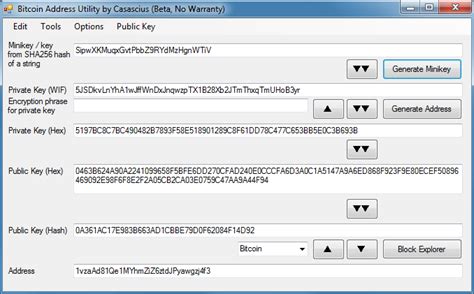Ethereum: Understanding Private Key Formats and Import Solutions
As Ethereum’s popularity continues to grow, many developers are looking to implement support for compressed public keys in Vanity Pool. However, one crucial aspect remains unclear: how will private keys be imported to a desired vanity address when using compressed or uncompressed formats?
In this article, we will delve into the world of Ethereum private key formats and explore what to expect when importing solutions to a desired vanity address.
Ethereum Private Key Formats
Ethereum uses two main formats for private keys: uncompressed and compressed. The uncompressed format is the standard and recommended way to store and transmit private keys on the Ethereum network.
The uncompressed format stores private keys in binary (base 64) format, allowing for efficient transmission over long distances without losing any information. On the other hand, the compressed format uses algorithms like LZ77 or DEFLATE to reduce the key size while preserving its integrity.
Compressed and Uncompressed Formats
When importing solutions to a desired custom address on Vanity Pool, you will need to decide which format to use for your private keys:
- Uncompressed Format – This is the default recommended format on Ethereum. Using the uncompressed format will ensure that your private keys remain intact and can be easily imported into any Ethereum-compatible wallet or wallet software.
- Compressed Format
– If you prefer to reduce the size of your private key, the compressed format may be a better option. However, it is essential to note that compressed formats may lose some information, making it difficult to recover the original key if something goes wrong.
Importing Solutions to a Desired Custom Address
When importing solutions to a desired custom address in Vanity Pool, you will need to decide which private key format to use:
- Uncompressed Format – To import uncompressed public keys to a desired custom address, simply select the “Uncompressed” option in your wallet software or solution provider.
- Compressed Format – If you opt for compressed keys, be sure to select the correct compression algorithm (e.g. LZ77) and adjust any configuration options your solution requires.
Potential Issues with Compressed Formats
While compressed formats can be beneficial in reducing key sizes, there are some potential issues to be aware of:
- Key Recovery – If something goes wrong during the import, you may have difficulty recovering the original uncompressed private key. This could lead to significant financial losses or even irreversible data loss.
- Compatibility

: Compressed keys may not be supported by all wallets or wallet software, which can cause compatibility issues and other problems.
Conclusion
When importing solutions to a desired custom address in Vanity Pool, it is essential to choose the correct private key format. The uncompressed format is recommended for its reliability and security. However, if you prefer compressed formats, be sure to use the correct algorithms and configuration options that your solution requires.
By understanding these nuances, developers can confidently import encrypted or compressed public keys to their desired vanity addresses in Vanity Pool, ensuring the integrity and security of their Ethereum private keys.